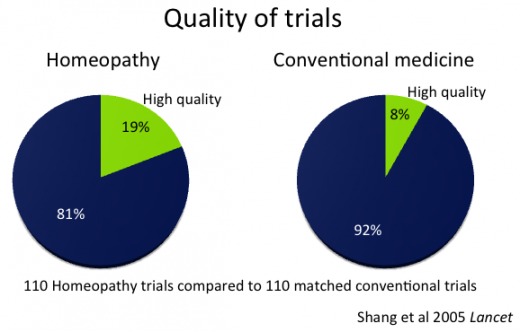Is homeopathy research good quality?
The quality of homeopathy research compares well to that of conventional medical research.
Only one study has compared the quality of homeopathy research with that of conventional medicine. Overall the homeopathy trials were found to be of higher quality than the conventional trials they were compared to.1

Researchers compared 110 homeopathy trials and 110 matched conventional-medicine trials: 21 homeopathy trials and 9 conventional-medical trials were assessed as ‘higher quality’ (19% of homoeopathy trials and 8% of conventional-medicine trials).
In 2016, a rigorous study published in the prestigious journal Systematic Reviews also found that only 6% of randomised clinical trials (RCTs) of conventional medicine are high quality.2
The quality of clinical trials is most commonly determined by measuring their ‘risk of bias’ (ROB) i.e. the likelihood that features of the study design, or way the study was carried out, will distort the results. ROB is assessed by comparing a study against a checklist of what is considered ideal. Low risk of bias = high quality; moderate risk of bias = medium quality and high risk of bias = poor quality. A sample of 100 Cochrane reviews of conventional medicine found that only 6% of included RCTs were rated as low risk of bias.
Whilst these studies are an important reminder that raising research standards in biomedicine is an ongoing issue, any claims that homeopathy research is of particularly poor quality compared to conventional medicine are unfounded.













